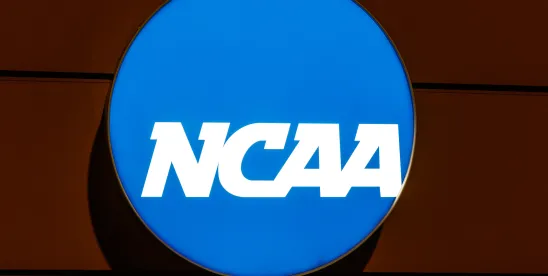The House v. NCAA settlement, effective July 1, 2025, marks a new era in college sports compensation that allows for payments to student-athletes for the use of their name, image, and likeness (NIL) from their colleges or universities. Despite these advancements, receiving NIL payments will create a unique challenge for international student-athletes, the vast majority of whom are studying in the U.S. on student visas that limit their ability to work. The absence of federal guidance on this issue further complicates international student-athletes participation in monetizing their NIL, both through payments from their school and third-party deals. Institutions of higher education and student-athletes should pay close attention to ensure their ongoing legal compliance.
Visa Constraints and Employment Restrictions
International student-athletes, who typically study in the U.S. on F-1 student visas, must navigate immigration law limits on their ability to work in the U.S. F-1 visa holders are generally prohibited from working off-campus without specific authorization. On-campus employment is permitted if it is directly affiliated with the school and meets other requirements, but NIL-related activities often fall outside these boundaries.
Under immigration law, “employment” is broadly defined in 8 CFR § 274a.1 to include any service or labor performed in the U.S. for an employer or other entity in exchange for compensation, which could be monetary or otherwise. It includes hourly and salaried employment, as well as independent contractor work, self-employment, and freelance work. It also may include volunteering if another person would be paid for the same work and/or if the work benefits a third party. The misconception that any type of “passive” income is permissible is incorrect, as there is no such exception under immigration law.
This broad definition of employment poses challenges for international student-athletes who wish to be compensated for their NIL without engaging in unauthorized employment, particularly when it comes to those student athletes engaging in promotional activities on behalf of their sponsors. The House Settlement clarifies that student-athletes can receive NIL payments without it being considered “pay to play.” However, the NCAA rules that arose out of the settlement – at least for now – require that some third party deals are subject to a fair market value test, and even deals with schools often require athletes to engage in certain promotional activities as a condition of payment. This requirement begs the question: can an international student athlete promote the monetization of their NIL without it being considered “work” under immigration law? The stakes are high: if an international student is found to have engaged in unauthorized employment, they risk losing their F-1 status and ability to stay in the United States, including for post-graduate opportunities.
So, how can an international student athlete promote their NIL without “working” under immigration law? Some creative solutions have emerged. For example, NIL promotional activities and payment may be conducted abroad without running afoul of U.S. immigration law. AI and social media managers can also play a role in making sure that the international student athlete is not performing “work” under immigration law. Engaging in promotional activities in the U.S., however, remains an unclear – and ultimately risky – proposition.
Implications for Institutions of Higher Education and Student-Athletes
Colleges and universities must carefully balance compliance with immigration laws while exploring NIL opportunities for their international athletes. Institutional agreements with international student athletes should recognize their unique status, and be structured to avoid an immigration violation. Institutions should also train their international student athletes on their obligations, keeping in mind that third party NIL deals could violate immigration law as well. Ultimately, the onus for compliance is on the student athlete; however, institutional support can play a role in making sure that student athletes are able to monetize their NIL without facing unintended consequences.







 />i
/>i

